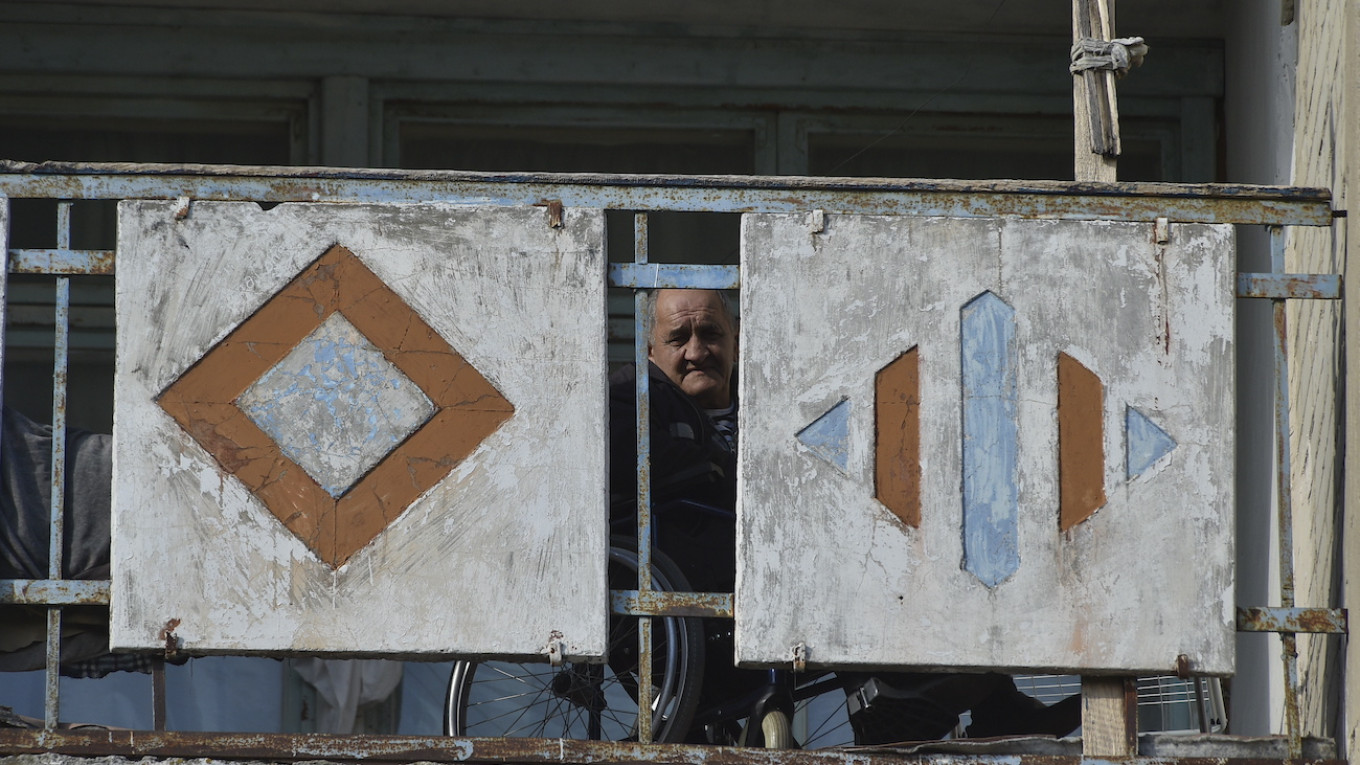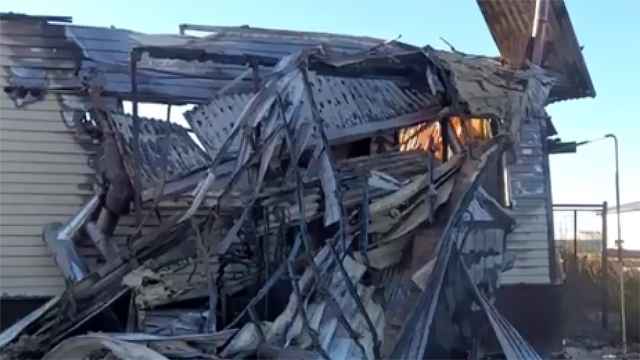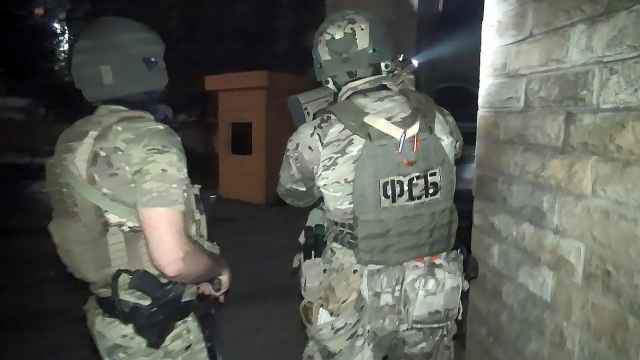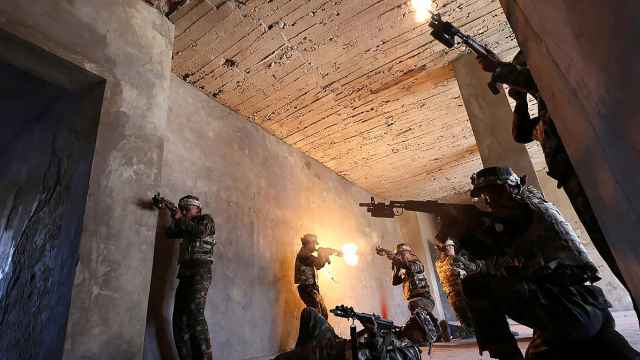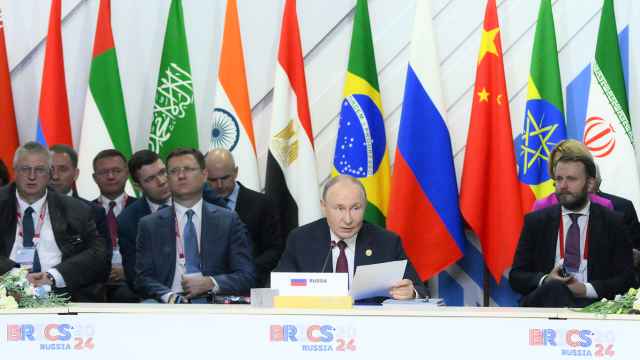Ukraine's Russian-occupied city of Kherson was cut off from water and electricity supplies Sunday after an air strike and a key dam in the region was also damaged, local officials said.
It is the first time that Kherson — which fell to Moscow's forces within days of their February offensive — has seen such a power cut.
"In Kherson and a number of other areas in the region, there is temporarily no electricity or water supply," the city's Moscow-installed administration said on Telegram.
It said it was the "result of an attack organized by the Ukrainian side on the Beryslav-Kakhovka highway that saw three concrete poles of high-voltage power lines damaged."
Energy specialists were working to "quickly" resolve the issue, the Russian-backed authorities said, as they called on people to "remain calm."
But the head of the regional administration, Yaroslav Yanushevych, blamed Russia for the power outages.
He said that in Beryslav city around 1.5 kilometers (just under a mile) of electric power lines had been destroyed — cutting off power entirely because the "damage is quite extensive."
"Probably, there will be no light in Beryslav until the city is completely de-occupied," he wrote on the Telegram social media platform.
"It is impossible to promptly repair the lines — there is a lack of specialists, equipment, and the Russian invaders will not allow this to be done."
News of the outage followed reports that the Kakhovka dam in the Russian-controlled region of Kherson was "damaged" by a Ukrainian strike.
"Today at 10:00 a.m. there was a hit of six HIMARS rockets. Air defense units shot down five missiles, one hit a lock of the Kakhovka dam, which was damaged," Russian news agencies quoted local emergency services as saying.
The RIA Novosti news agency quoted a local Moscow-backed official saying the damage was not "critical."
Ukraine in recent weeks warned that Moscow's forces intended to blow up the strategic facility to cause flooding.
The Kakhovka hydroelectric dam in southern Ukraine was captured by Moscow's forces at the start of their offensive. It supplies Russian-annexed Crimea with water.
Flooding threat
For weeks, Russian forces have rained missiles and explosive drones onto Ukraine's infrastructure, as a major Ukrainian ground offensive — propelled by Western arms deliveries — has pushed Russian troops back in swathes of the country.
"We are also aware of the fact that the terrorist state is concentrating forces and means for a possible repetition of massive attacks on our infrastructure, primarily energy," President Volodymyr Zelensky said in his evening speech, referring to Russia.
"In particular, Russia needed Iranian missiles for this. We are getting ready to respond," Zelensky said.
Kyiv mayor Vitali Klitschko said he does not rule out a full blackout in Ukraine's capital. "We are calculating various scenarios in order to withstand this and be prepared," he said.
Russian strikes over the past month have destroyed around a third of Ukraine's power stations and the government has urged Ukrainians to conserve electricity as much as possible.
But until now, Ukraine had only rarely struck Russian-held civilian energy infrastructure in territory annexed by Moscow, preferring to target Russian army supply lines.
As Ukraine presses a counteroffensive in the south, Moscow's occupational forces in Kherson have vowed to turn the city into a "fortress."
Russian forces have for weeks organized a civilian pull-out from the Kherson region as Ukrainian troops advance, which Kyiv has called "deportations."
Moscow-installed Kherson governor Vladimir Saldo said he was moving people further into the region or to Russia because of the risks of a "massive missile attack."
The dam's destruction would lead to flooding of the left bank of the Dnipro River, he said.
Zelensky said last month that Russian forces had mined the Kakhovka hydroelectric power plant with the intent of blowing it up.
Its destruction could cause flash-flooding for hundreds of thousands of people, he warned.
He said cutting water supplies to the south could also impact the cooling systems of the Zaporizhzhia nuclear power plant — the largest in Europe.
Meanwhile a Taiwanese man who volunteered to fight in Ukraine has died on the battlefield, Taipei's foreign ministry said, in what is believed to be the first person from the island killed in the conflict.
And in a final address on his visit to Bahrain, Pope Francis on Sunday urged congregants to pray "for Ukraine, which is suffering so much," and for an end to the war.
A Message from The Moscow Times:
Dear readers,
We are facing unprecedented challenges. Russia's Prosecutor General's Office has designated The Moscow Times as an "undesirable" organization, criminalizing our work and putting our staff at risk of prosecution. This follows our earlier unjust labeling as a "foreign agent."
These actions are direct attempts to silence independent journalism in Russia. The authorities claim our work "discredits the decisions of the Russian leadership." We see things differently: we strive to provide accurate, unbiased reporting on Russia.
We, the journalists of The Moscow Times, refuse to be silenced. But to continue our work, we need your help.
Your support, no matter how small, makes a world of difference. If you can, please support us monthly starting from just $2. It's quick to set up, and every contribution makes a significant impact.
By supporting The Moscow Times, you're defending open, independent journalism in the face of repression. Thank you for standing with us.
Remind me later.


